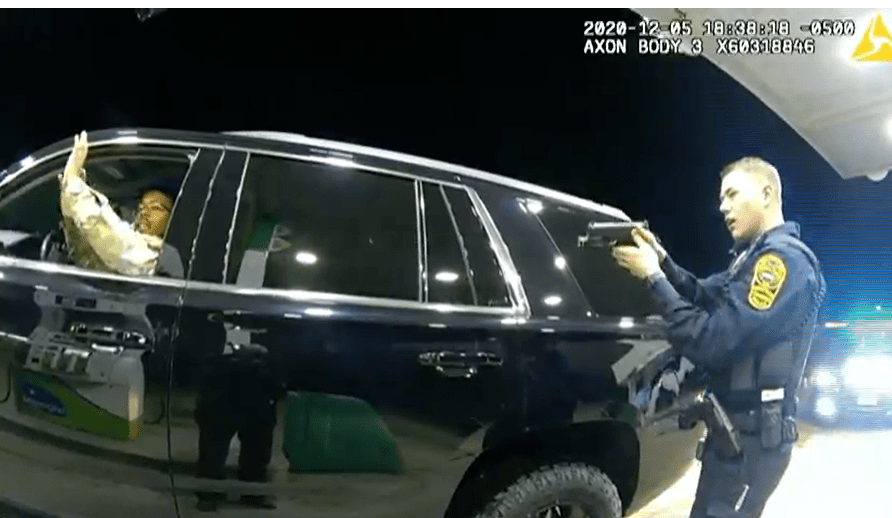(VM) – The traffic stop by two Windsor police officers of an Army officer should never have become a viral video.
The fact that it did, and that a federal lawsuit has been filed, means better training of officers is mandatory in law-enforcement departments across Virginia. Perhaps more importantly, the mindset of “compliance above all else” — an element in so many police encounters where Black and brown people are slain around the country — must be overhauled.
So-called “pretext stops” like this one “are racially discriminatory, and they are creating unnecessary opportunities for strife and use of force,” Jack Glaser, a social psychologist at the University of California at Berkeley, told me by email. An officer suspects someone is involved in a crime and he uses the “pretext of a traffic or equipment violation to legally justify the stop. It could be something as benign as going 5 mph over the speed limit, or the infamous broken taillight.”
“Police will do better to fight crime by operating on specific intelligence about known suspects,” said Glaser, who’s a principal investigator on a project to build a national database of police stops and use-of-force incidents.
This much should be clear to anyone who’s seen the Windsor body-cam video or read news articles about it:
Army 2nd Lt. Caron Nazario, dressed in his military uniform, hadn’t broken any law when officers stopped him the evening of Dec. 5 as he drove his brand new SUV. An officer on U.S. 460 initially noticed the soldier had no exterior rear license plate; Nazario slowed down and pulled into a well-lit gas station, taking less than two minutes, his attorney said.
That’s a standard maneuver in the dark, on a busy stretch of road.
When police arrived at the gas station, they should’ve seen the temporary plate in the SUV’s window. It’s visible in video footage, even though the Chevrolet Tahoe has tinted windows. Their reply should’ve been: “Never mind, sir. Go on your way. Thank you for your service.”
That the incident turned south so quickly – and so dangerously – is appalling.
Police drew their guns. They shouted sometimes-conflicting orders to the 27-year-old Nazario, who is Black and Latino, and who said he was “honestly afraid to get out” of the vehicle. “You received an order, obey it!” one officer shouted.
If two officers had their weapons aimed at me, I’d be scared to move a muscle. A minor twitch could leave my family planning funeral arrangements.
Nazario was pepper-sprayed, jostled and handcuffed, body-cam footage reveals and the lawsuit contends. Eventually, after all of this, the Army officer was released without charges.
We know these details because the small town, 30 miles west of Norfolk, says it provided documents and related video to attorneys for Nazario. Police body-cam footage was available. Nazario began recording footage, too, on his cellphone during the incident. Other details come from the allegations in the lawsuit against Windsor officers Joe Gutierrez and Daniel Crocker.
Not until the repeated airing of the video did the town fire Gutierrez, WAVY.com reported Tuesday. He was the more aggressive of the two police officers in the video, and the one who pepper-sprayed Nazario. The town has said department-wide requirements for more training started in January.
The Virginian-Pilot first reported on the stop. News outlets suggest Crocker, the Windsor officer who initiated the stop that day, remains on the department.
My messages to the town manager were not returned by Tuesday afternoon.
The incident has caused an obvious firestorm among state leaders and the NAACP. Gov. Ralph Northam has called for a State Police investigation. Attorney General Mark Herring requested information from the Windsor Police Department.
“To tell us that a Black Army second lieutenant in uniform can have that type of treatment imposed upon him, imagine what happens when the body cameras are off,” state NAACP Executive Director Da’Quan Love said at a news conference Monday, my colleagues at The Virginia Mercury reported. “Imagine what happens on dark roads across the length and breadth of this commonwealth.”
It’s a scary thought.
Mind you, the treatment Nazario endured would’ve been horrible regardless of race. But we don’t see or hear about these incidents happening to Whites at the same rates as Black and brown motorists.
Too many of these cases turn tragic, even when the underlying infraction is minor. Look at the fatal shooting of Daunte Wright near Minneapolis this week. He was pulled over for expired tags, then resisted arrest for an outstanding misdemeanor warrant. A police officer reportedly mistook her gun for a Taser, killing Wright, officials said.
Wright would be alive had he “submitted.” He surely didn’t deserve to die for resisting on a minor charge. On Tuesday, the officer who killed Wright and the Brooklyn Center, Minn., police chief resigned.
Jeffrey Fagan is a professor at Columbia Law School and studies policing, crime, gun control and race. He told me the benefits of many police stops are slim.
“Black drivers (are) searched more, but the rate at which contraband is found in those searches is no different,” Fagan said by email. “The difference in suspicion that motivates the higher search rate suggests either racial bias … or statistical discrimination because police believe that Black and LatinX drivers are more likely to be carrying contraband.
“Either explanation suggests that there is invidious discrimination (to use the Supreme Court’s term) that infects policing.”
It’s time for police to rethink their attitudes and decision-making regarding police stops. In too many cases, they’ve become flashpoints for violence.
People of color would embrace the de-escalation. They’d also like staying alive.



